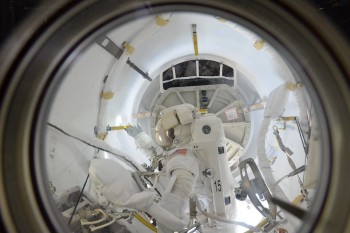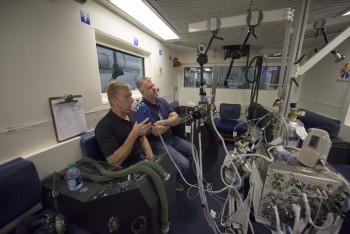Breathe in, breathe out. Tim Kopra and I are heading back to the airlock… This time we are not going on a spacewalk but instead we will be pumping some of the air out of the Quest module in the name of science. By reducing the pressure in the airlock we can simulate being at high altitude – or in a future lunar habitat that will likely be kept at lower pressures than on Earth – because it is cheaper and easier to build structures to withstand lower pressures.

Tim Kopra in the Quest Airlock after his spacewalk 21 December. Credits: ESA/NASA
Living in space is not easy on the human body. Over millions of years humans have evolved to live with gravity, take it away and our bodies adapt and cope remarkably well, but I still need to monitor almost every aspect of my health up here. Luckily I have a flight surgeon at the European Astronaut Centre and a team of biomedical engineers who watch out for me daily, but space medicine is still a very new discipline.
One area researchers are looking at is my lungs – astronaut’s lungs may become easily irritated or inflamed if we inhale dust particles (thankfully I haven’t had any problems so far). For the Airway Monitoring experiment Tim and I will breathe into a specially-developed mask that measures the nitric oxide we exhale which is a good indicator for inflammation of the lungs.
The weightlessness makes dust more likely to get into our lungs. On Earth, dust settles on the floor, but without gravity dust never settles, which is one of the reasons we clean the Space Station as thoroughly as we can every Saturday. On the Moon and Mars it will be worse because, although there is gravity, it is weaker than on Earth and there is a lot more very fine dust, which also sticks to astronauts due to static electricity.

Training with Airway Monitoring equipment at NASA’s Jonson Space Center, USA.
On Earth doctors would use an X-ray or CT scan to test whether a patient’s lungs are inflamed but in space these large machines are not an option – so necessity breeds creativity. The researchers of the Airway Monitoring experiment devised this “simple” nitric-oxide test and Tim and I are part of the study to see if it works in space.
The Airway Monitoring experiment is the kind of research we astronauts love. Not only do we get to use the airlock for scientific purposes – but we are also contributing to creating knowledge that will help our future colleagues explore new environments in our Solar System. Moreover, this study will increase our general understanding of problems with airway inflammation and could provide valuable research into new methods for treating conditions such as asthma. As a bonus Airway Monitoring does not require that we draw blood samples so the needles can stay in their pouches!
Breathe in, breathe out. For most people this is second nature and we hardly think about it until something goes wrong. For the millions of people suffering from asthma around the world this nitric-oxide lung test could offer a quick and cheap way to diagnose lung problems everywhere – if it works in space it should work anywhere on our planet.

Discussion: 19 comments
Interesting project for me as I have asthma. Thanks Tim, I shall follow this with great interest xc
That’s right you should
Absolutely fascinating. Keep up the good work.
Such useful research and info which is helping me fins tune space adventure stories. Thank you.
You are acheiving amazing results and innovstions which I pray will result in more positive reaction towatds space exploration…just please don’t open the wrong door !! X
You are the best astronaut Tim Peakes. You mean a lot to me.
Now, we called it a bell phere, thanks for the photo.. Now in regards to the sunrise picture… it’s hard to determine whether it’s a sunrise or sunset by a picture
Members of my family suffer with bronchitis and asthma. I was also a a general nurse and worked with patients with chronic conditions in the early 1970’s. Medicine has made progress since then and thank you Tim Kopra and Tim Peake for taking part to further add to the body of knowledge. To witness someone with asthma is heart breaking you feel helpless as they attempt to breath a function we take for granted
Such interesting things you get to do. Never realised how dust could be as issue. Kind of thought there was none in view of the cleanliness etc. Thank you for being so informative and such a great ambassador for UK and space exploration.
fascinating stuff keep up the good work Tim, we love you!
Greatly interested in this work Tim, as I suffer from asthma. Keep up the good work and enjoy. Dave in N Wales
Will be very interested in rezults. Asthma has been in my family for years. Keep up the good work.
The world should be So grateful to you both / all, it sounds as if you are going out of the way to save lives – please do take care of yourselves too. (I used to nurse sick neonates on hyperbaric 02. To make up for lower pressure, are you getting any extra 02 in the chamber? Thank you all.
Thank you Tim for keeping us up to date with your space adventure, we look forward to reading your reposts.
Tim, you are an inspiration to us all. I’m establishing a Rotary Satellite Club in the Accrington area of Lancashire, aimed at young business professionals who want to make a difference in their community. We would love you to be an honorary member, what do you think?
A reason to believe in humanity and the future. Congratulations.
Hi Tim,
Thank you for this amazing website its awesome!!
I have a question,how does the dust particles get in? Is it when you open the air lock? Or when you eat food? Or is it from the people?
Many thanks Luke R. Age:9
Very interesting from prospective of a respiratory physiotherapist in palliative care working at a hospice..any help in understanding respiratory disease is fantastic and a great advance in medical care. Thank you.
By following your adventures I’ve learned something new about gravity–it keeps dust out of our lungs! I’m an artist who is investigating gravity and how it affects our daily lives and influences the world around us. Your weightless environment is the perfect place to reflect on this force. Are there small things you and your team miss about gravity? Could be small things…the weight of a cup of warm tea in your hands or pen caps that don’t stay put. Thanks for reading.